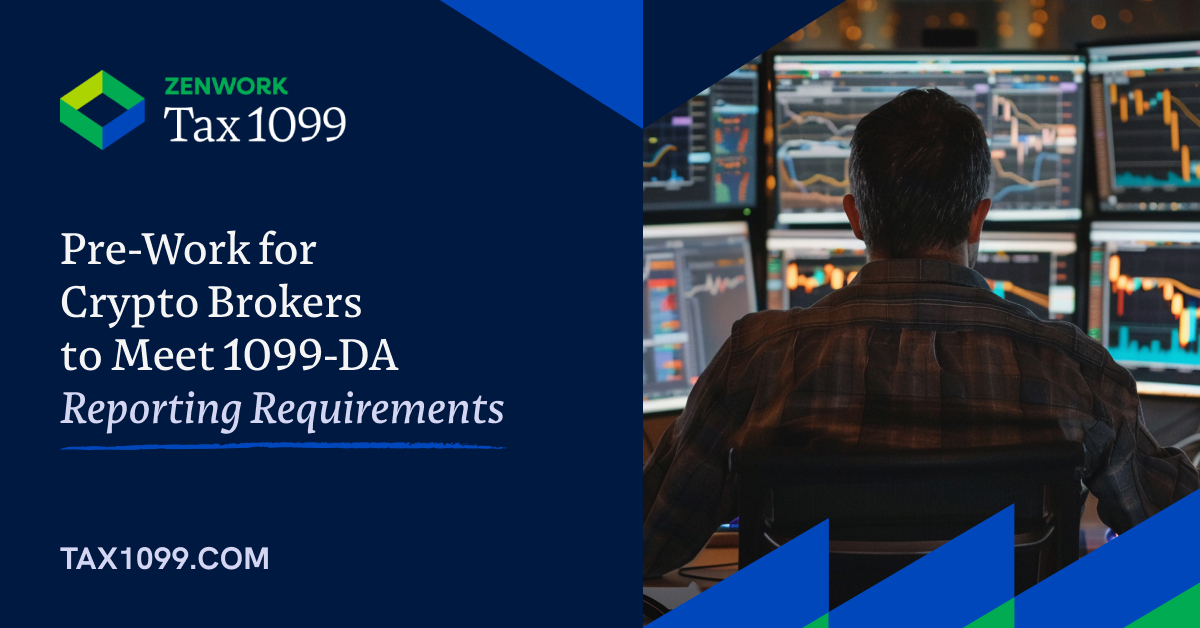2025 is around the corner, and with the new year comes the new IRS Form 1099-DA reporting requirements for crypto brokers. The Form 1099-DA, Digital Asset Proceeds from Broker, is for crypto brokers to report information about customers’ digital asset transactions to the IRS. It is a new IRS form designed to enhance cryptocurrency tax reporting compliance and will impact reporting starting in 2025.
Crypto brokers and wallets subject to these new reporting requirements shouldn’t wait until next year to start focusing on what they need to do. IRS Form 1099-DA filers must do pre-work to get ahead and prepare to meet the reporting requirements or face substantial penalties for non-compliance.
Review Required Information for IRS Form 1099-DA
First things first, before crypto brokers can do much of anything, they need to know what information the IRS expects them to collect to file the Form 1099-DA. The IRS published final regulations and draft instructions for Form 1099-DA, which filers can find online through the IRS website. These two resources give crypto brokers directions on what they must report on the form to ensure they have processes set to track the information in 2025. Not all transactions are considered reportable sales for the form, so understanding what filers need to report can reduce unnecessary data collection. Check out Tax1099’s blog for additional resources on what information brokers can expect to report on IRS Form 1099-DA.
Determine How to Track the Required Information
After filers review the Form 1099-DA regulations and know what information they need to report, the next step is determining how to track it. One of the major concerns with this new form is the tracking and reporting of cost basis information. While crypto brokers aren’t required to report cost basis information on the form until 2026, they should invest the time now upgrading their systems to track this information. Crypto brokers may need to consider sharing information between brokers to obtain accurate cost basis data for their customers’ assets. Inter-broker information sharing can take time to figure out, so figuring out the logistics early can help avoid scrambling when it comes time to report this information.
Reach out to Customers About IRS Form 1099-DA
Since the IRS Form 1099-DA is a new form that many crypto taxpayers are unfamiliar with, crypto brokers may want to consider reaching out to customers and assuring them they are handling the reporting requirements. Proactively communicating with customers and letting them know you are on top of your filing obligations can help bolster their confidence in your platform. Given the scandals over the past few years involving some questionable activity on a few crypto platforms, even small things you can do to help customers feel comfortable and assured in your service can go a long way. Consider creating a page on your website informing customers of the information you may need from them and what they can expect in the upcoming year.
Review your Policies
Brokers should also review their internal policies regarding customers and the information they require users to provide. As with any U.S. tax form, the Form 1099-DA requires brokers to report personal customer information like names, addresses, and taxpayer identification numbers. Crypto brokers filing this form next year should update internal policies requiring customers to provide all personal identification information if they don’t already. Provide guidance to customers who are unwilling to provide the necessary information so you can stay compliant with IRS regulations.
Make a Plan for Filing the Form 1099-DA
If IRS Form 1099-DA is the first tax form your crypto platform is filing with the IRS, it is likely that your company does not already have a way to file tax forms. Since the IRS has indicated in the draft Form 1099-DA instructions that brokers must file a separate form for the disposition of each type of security (short-term covered, long-term covered, and noncovered securities), crypto brokers should expect to file a large volume of forms. The large volume of forms makes manually printing and filing the forms nearly impossible. Crypto brokers must plan how they will e-File all Form 1099-DAs with the IRS.
Penalties for Non-compliance
Form 1099-DA filers also need a plan for filing so they can file correctly and on time. The IRS charges penalties for late filing or noncompliance for information returns as well as corrections to previously filed returns. Penalties are calculated per form and can add up very quickly for filers with a large volume of returns.
|
Year due |
Up to 30 days late |
31 days late through August 1 |
After August 1 or not filed |
Intentional disregard |
|
2025 |
$60 |
$130 |
$330 |
$660 |
|
2024 |
$60 |
$120 |
$310 |
$630 |
Form 1099-DA filers should consider contacting a trusted platform like Tax1099 for help filing the form. As an IRS-authorized e-file provider, Tax1099 has partnered with thousands of businesses, providing a convenient solution to e-filing IRS tax forms. Our team can help ensure you file Form 1099-DA accurately, so you feel confident in meeting your reporting obligations and avoid costly IRS penalties. Reach out to our team today to discuss your filing options.



